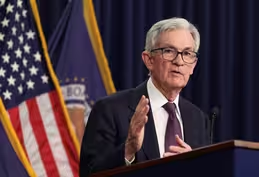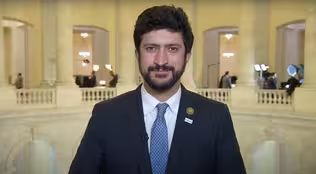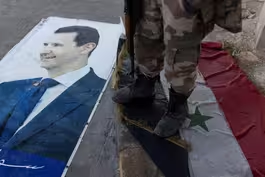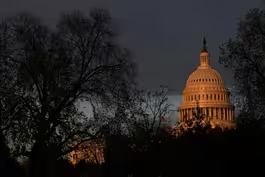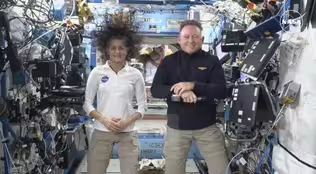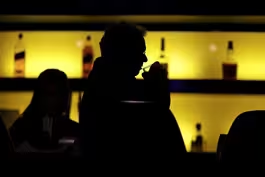
Syrians attempt to uncover fate of Assad's prisoners
Clip: 12/18/2024 | 3m 36sVideo has Closed Captions
Syrians attempt to uncover fate of thousands detained and feared murdered under Assad
As we learn more about the atrocities committed by the Assad regime, investigations are underway at sites across that country. Authorities and relatives are trying to uncover the fate of the many thousands detained and feared murdered during Assad's rule. Simona Foltyn visited three mass grave locations and reports.
Problems playing video? | Closed Captioning Feedback
Problems playing video? | Closed Captioning Feedback
Major corporate funding for the PBS News Hour is provided by BDO, BNSF, Consumer Cellular, American Cruise Lines, and Raymond James. Funding for the PBS NewsHour Weekend is provided by...

Syrians attempt to uncover fate of Assad's prisoners
Clip: 12/18/2024 | 3m 36sVideo has Closed Captions
As we learn more about the atrocities committed by the Assad regime, investigations are underway at sites across that country. Authorities and relatives are trying to uncover the fate of the many thousands detained and feared murdered during Assad's rule. Simona Foltyn visited three mass grave locations and reports.
Problems playing video? | Closed Captioning Feedback
How to Watch PBS News Hour
PBS News Hour is available to stream on pbs.org and the free PBS App, available on iPhone, Apple TV, Android TV, Android smartphones, Amazon Fire TV, Amazon Fire Tablet, Roku, Samsung Smart TV, and Vizio.
Providing Support for PBS.org
Learn Moreabout PBS online sponsorshipGEOFF BENNETT: As we learn more about the atrocities committed by the Assad regime, investigations are under way at sites across that country.
Authorities and relatives are trying to uncover the fate of the many thousands detained and feared murdered during Assad's rule.
Simona Foltyn went to visit three mass grave locations today, and she joins us now.
Simona, tell us what you saw.
SIMONA FOLTYN: Well, Geoff, it was quite grim, and these mass graves really bear witness to just how systematic the killing was under Assad's government, and the details are only just beginning to come out.
The first site we went to was in Tadamon, which is a suburb in the south of Damascus, and it is known for a massacre that occurred there in 2013, alongside a series of other extrajudicial executions.
Essentially, this neighborhood had been turned into a killing field, and when we went there, residents pointed us to several shallow graves that had been dug in between the homes.
We saw human remains and bones sticking out of the ground, children playing on these sites.
So it was quite jarring to see also how accustomed people had become to living near these mass graves, which haven't been secured at all.
Now, the second site we went to was quite different.
It was in a rural area close to the prison of Sednaya, which has been, as we know by now, dubbed the human slaughterhouse of Syria.
And this site is probably where many of the thousands of people who perished in Sednaya were buried.
It was a lot more organized.
You could tell that the site had been planned out.
It had been segregated into sections, and the vaults had been lined with concrete.
So it was quite shocking to see how much planning and effort the government had exerted into disappearing and killing people.
It was not really something that happened randomly or in an isolated manner.
It was very much a function of the state.
GEOFF BENNETT: How is the new government navigating this work of trying to secure these sites while starting the delicate work of unearthing them?
SIMONA FOLTYN: Well, not much has really happened on this front, and it's really too soon to start thinking about exhuming these sites, even though, of course, the relatives, they want answers, they want the remains of their loved ones.
When we were there at one of the mass graves, we met two siblings who had just found out that their brother was likely buried in one of these mass graves, and they essentially demanded that the grave be opened immediately.
But the country and the government are just not ready for that.
These are crime scenes that must first be secured and then exhumed with the necessary expertise and equipment, none of which are available in Syria at the moment.
And just to give you an example, Geoff, for example, the only DNA testing facility that was available in Syria was part of a research facility.
Currently, the country has no capacity to be doing DNA testing so as to identify these bodies and hand the remains back to the relatives.
So this is probably going to take a long time until a mechanism is put in place to start exhuming, which means a lot more waiting, a lot more agony for the people here in Syria who are waiting for answers and for closure.
GEOFF BENNETT: Simona Foltyn reporting tonight from Damascus.
Simona, thank you.
Fed lowers interest rates again but future cuts in question
Video has Closed Captions
Clip: 12/18/2024 | 5m 34s | Fed lowers interest rates again but inflation concerns make future cuts uncertain (5m 34s)
Rep. Casar on progressive caucus effort to rebrand Democrats
Video has Closed Captions
Clip: 12/18/2024 | 6m 15s | Rep. Greg Casar outlines progressive caucus efforts to rebrand Democratic Party (6m 15s)
Syrians face horrors at site of Assad's chemical attack
Video has Closed Captions
Clip: 12/18/2024 | 8m 34s | Amid new freedoms, Syrians face horrors at site of Assad's 2013 chemical weapons attack (8m 34s)
Trump tells GOP to reject government funding bill
Video has Closed Captions
Clip: 12/18/2024 | 5m 56s | Trump tells GOP to reject funding bill that would avoid a government shutdown (5m 56s)
U.S. astronauts stranded in space face another delay
Video has Closed Captions
Clip: 12/18/2024 | 6m 10s | U.S. astronauts stranded in space face another delay before they can return to Earth (6m 10s)
Why a promising treatment for alcohol abuse is barely used
Video has Closed Captions
Clip: 12/18/2024 | 10m 21s | Why a promising treatment for alcohol abuse is barely used (10m 21s)
Providing Support for PBS.org
Learn Moreabout PBS online sponsorship
- News and Public Affairs

FRONTLINE is investigative journalism that questions, explains and changes our world.

- News and Public Affairs

Amanpour and Company features conversations with leaders and decision makers.












Support for PBS provided by:
Major corporate funding for the PBS News Hour is provided by BDO, BNSF, Consumer Cellular, American Cruise Lines, and Raymond James. Funding for the PBS NewsHour Weekend is provided by...
